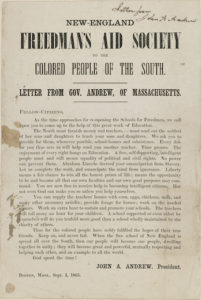
*The Freedmen's Aid Society was celebrated on this date in 1861 during the American Civil War. It was founded by the American Missionary Association (AMA), a group supported by the Congregational, Presbyterian, and Methodist churches in the American North.
It organized a supply of teachers from the North and provided housing for them to set up and teach in schools in the South for freedmen (emancipated slaves) and their children. After the war, the AMA founded more than 500 schools and colleges for freedmen in the South to educate freedmen as teachers, nurses, and other professionals. The work of the Society accelerated with the end of the war and the beginning of the Reconstruction era.
Education for freed slaves was considered a top priority among blacks and whites. Various religious groups and denominations supported the Society, which began work in the South three months after organizing. By the end of the first year, it had recruited 52 instructors. The teachers instructed more than 5,000 students in 59 schools. The schools were open to the South's men, women, and children. By the turn of the century, Blacks had raised their literacy rate by an amazing amount; it was a major success story since the war's end.
By then, the conservative Democratic-dominated state legislatures had imposed racial segregation and were underfunding Black schools and other facilities. Leadership and control of the Freedmen's Aid Society have been attributed to the Congregational and the Methodist Episcopal churches. The Methodist version of the Society's history states that it was founded in 1866. It was "directed by a Board of Managers who were elected by the (Methodist) General Conference."
In 1920 it was reorganized and renamed the Board of Education for Negroes, and in 1939 absorbed into the Board of Education of the Methodist Church.